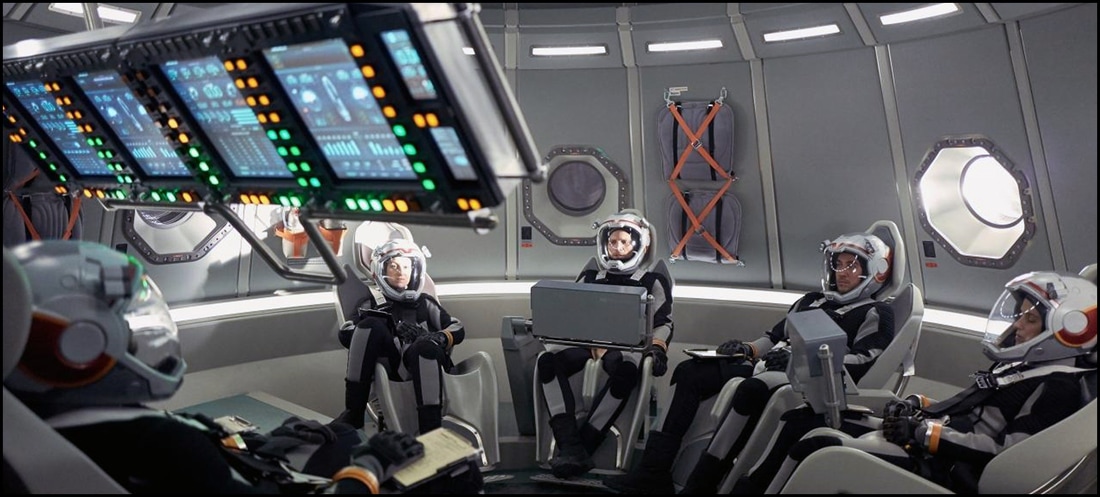Films popular with audiences continue to explore what “man in space” might truly look like; and while many of them pony up more fanciful observations than they do true science Hollywood and beyond has grown more interested in the practical logistics of legitimate space exploration. I’ve read that most folks attribute this newfound desire to “get it right” is owed to the fact that Mars is daily growing more and more within our technological grasp, so why wouldn’t an organization like National Geographic wish to get to the front of the line in such portrayals?
NatGeo – in its purest sense – has always been about the science, and they’ve definitely given audiences something to think about with MARS, a fictional examination of what awaits us about two decades down the space-faring road.
From IMDB.com:
“The first manned mission from Earth to Mars in 2033 attempts to colonize the red planet.”
Certainly, there’s much more than goes on in MARS than just man’s expansion onto the fourth planet in our solar system, but that concise summary does the trick. Truth be told, there’s arguably as much drama going on back here on Earth at times as the (fictionalized) viewing public goes through the emotional highs and lows common to the Apollo program and the various nations of the world sponsoring this first venture begin to wonder whether it’s all worth it. While there are perhaps a million good reasons for us to push out from the Big Blue Marble onto the red one, there’s no escaping the fact that we – as beings – weren’t exactly “designed” for space much less another world entirely; and it’s these risks that keep MARS as mostly reliable “edge of your seat” viewing.
This first season is broken up into six hours (the home video set includes a seventh one which is essentially a behind-the-scenes documentary on the making-of the entire series) which cover the first few missions meant to colonize that world and the troubles these explorers encounter. To my surprise, much of it is exceedingly accessible despite the preponderance of science, and that’s largely due to the way the series is constructed: the segments kinda/sorta jog back-and-forth between fiction and documentary. For example, when the astronauts reach Mars but are hamstrung by orbital problems, the producers cut away to today’s scientists explaining precisely what kinds of challenges we can expect to stand in our way on such a fateful journey. So instead of bombarding the audience with bells, whistles, and flashing lights without explanation, MARS strikes a balance between the story and the science, a narrative device that’s probably as risky as it is effective at times.
To further confound matters in the program’s earliest hours, the screenwriters even insert a faux documentary into the drama, allowing fictional characters to sound off on what they were anticipating once they arrived on our neighboring planet. They even allowed the future’s fictional experts to occasionally comment on affairs; and this forced me early on to realize that MARS as constructed was really not intended for casual viewing. After all, you couldn’t take your eyes off those first two hours without knowing for sure whether or not you were being presented with a literal scientist (from today) or a figurative one (from our future), a development that did not work as well as I suspect was intended. Thankfully, this film-within-a-film technique lessens as the series goes on, and there’s much more old-fashioned storytelling to the final three episodes than was in the first three.
So long as you’re able to keep that straight, MARS excels at doing what it set out to do, giving you a picture of the true risks associated with space travel and planetary colonization.
HIGHLY RECOMMENDED. Though I’m offering up exceedingly high praise for MARS (2016), this is not to say that this was the “easiest” way to follow this story; the first few episodes heavily employ a mixed narration (story + faux documentary + real documentary) which entirely fragments those early events to the occasional point of confusion. As the show goes on (by third hour or so), the bits and pieces of the faux documentary trim down to the point wherein one might even question whether they were truly needed in the first place. But the story involving mankind’s attempt at bringing life to Mars is probably as realistic and compelling as one would expect with a major motion picture, so kudos to all involved in making this look at the Red Planet one worth the investment.
In the interests of fairness, I’m pleased to disclose that the fine folks at ThinkJam provided me with a Blu-ray of MARS (2016) by request for the expressed purposes of completing this review; and their contribution to me in no way, shape, or form influenced my opinion of it.





 RSS Feed
RSS Feed